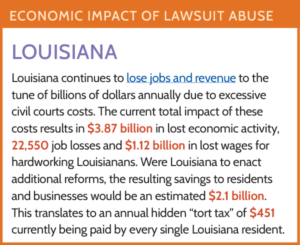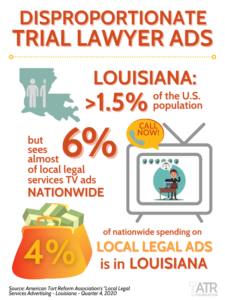JUDICIAL MISCONDUCT CONTINUES TO RUN RAMPANT
Louisiana has a longstanding reputation for its lack of transparency dealing with judicial misconduct. Scandals continue to bring attention to this issue, contributing to both the public and legislature losing patience with the judicial branch’s repeated promises to do better.
Changes to the Louisiana Supreme Court’s procedures adopted in 2020 are a step in the right direction, but do not do enough. Most notably, “confidentiality still remains during the Commission’s initial consideration of a complaint and during any investigation of a complaint,” the court announced. This means that the public will remain unaware of complaints filed against judges that do not lead to action by the Judiciary Commission.
Scandals continue to plague members of the judiciary as outlined below. Most notably, Louisiana Supreme Court Justice Jefferson Hughes, III admitted to committing judicial misconduct over a visit to the home of a Hammond political operative who alleged Justice Hughes offered him money to shift support to another candidate vying for an open seat on the Louisiana Supreme Court. Justice Hughes agreed to pay more than $2,000 to the state judicial commission to cover the costs of the investigation and was publicly censured for violating several judicial canons.
Disciplinary hearing set over judicial transparency
In a November hearing, the Judicial Commission of Louisiana investigated Louisiana district court judge’s alleged unethical conduct during a 2018 election campaign, a sign that the state is hopefully starting to address its lack of judicial transparency.
The Commission is investigating allegations that Fourth Judicial District Court Judge Sharon Marchman made false and misleading statements about her 2018 opponent, Judge James “Jimbo” Stephens.
The allegations include misleading soft-on-crime attack ads launched by Judge Marchman’s campaign. In 2018, the Louisiana Judicial Campaign Oversight Committee concluded that Marchman violated a canon of the Louisiana Code of Judicial Conduct by falsely connecting Judge Stephens with Senator Bernie Sanders.
“Louisiana’s long-standing lack of judicial transparency is a big part of the problem that continually lands our state at or near the bottom of most national business climate rankings,” said Lana Sonnier Venable, executive director of Louisiana Lawsuit Abuse Watch. “Instances of alleged misconduct, like this one, are being more widely reported and continue to draw the ire of the public.”
Use of Mandatory Bar Association Dues for Lobbying
A pair of federal court rulings could soon free Louisiana lawyers from mandatory bar membership.
In July, the Fifth Circuit reopened a case brought by New Orleans attorney Randy Boudreaux, who claims that mandatory bar membership violates his first amendment rights because the bar uses his membership dues for political lobbying purposes.
The appellate court did not yet eliminate the requirement for lawyers to join the bar, but it did say the bar association failed to properly disclose its activities, reversing a 2020 U.S. District Court dismissal of Boudreaux’s claims.
The Louisiana State Bar Association (LSBA) frequently engages in political or ideological initiatives completely unrelated to the practice of law, largely fighting against tort reform in the legislature. Since at least 2007, the LSBA has used mandatory membership dues to take a position on more than 500 bills filed in the state legislature.
 The optimism expressed in last year’s Judicial Hellholes® report that Louisiana’s litigation environment was moving in the right direction faded in 2021 with a veto of a much-needed bill to rein in deceptive lawsuit advertising practices while coastal litigation continued to drain state resources. Judicial misconduct appears to run rampant across the state and the investigation continues into a massive scheme to defraud commercial truckers and insurers in Louisiana courts.
The optimism expressed in last year’s Judicial Hellholes® report that Louisiana’s litigation environment was moving in the right direction faded in 2021 with a veto of a much-needed bill to rein in deceptive lawsuit advertising practices while coastal litigation continued to drain state resources. Judicial misconduct appears to run rampant across the state and the investigation continues into a massive scheme to defraud commercial truckers and insurers in Louisiana courts.






